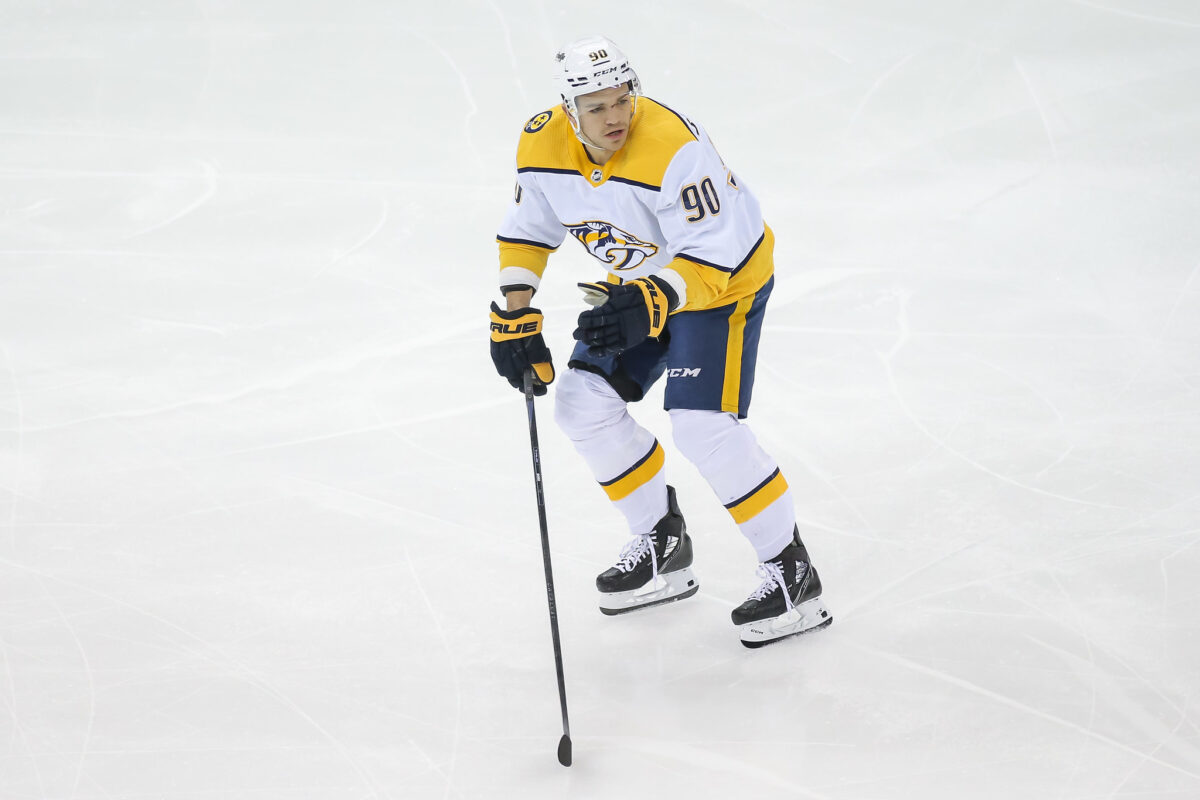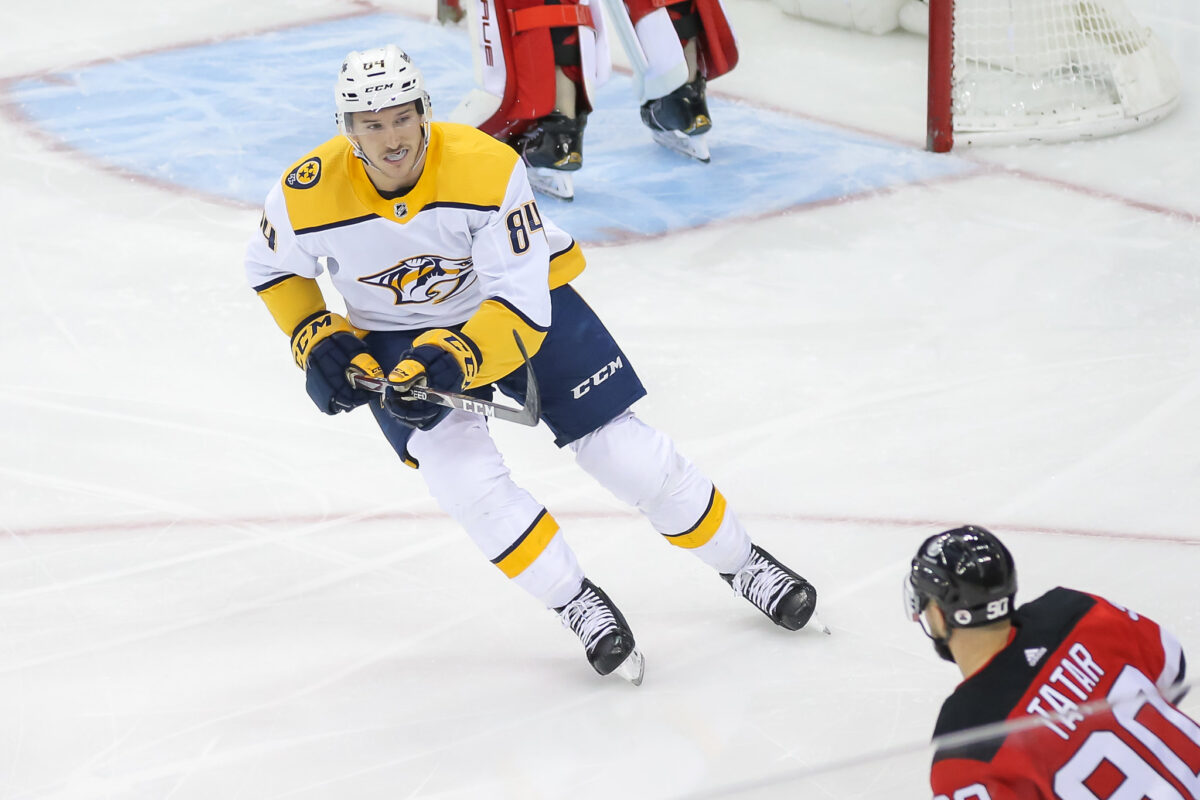As Matt Borowiecki sat in the penalty box, watching the Nashville Predators squander an early 2-0 lead, it was a feeling both he and his team recognized all too well. It’s to the surprise of nobody that the Predators are the most penalized team in the NHL this season, but on Saturday night it came back in behemoth fashion to bite Nashville on the behind. The Winnipeg Jets erased a two-goal deficit with three power-play goals, including two during a five-minute power play after Borowiecki landed an elbow to the chin of Evgeny Svechnikov. He received a five-minute penalty plus a game misconduct.
Related: 4 Jets to Watch During Second Half of Season
With a half period left to play and the game tied at two, it was yet again a penalty that made the difference. Borowiecki’s trip to the box (and to the locker room) was the team’s 33rd major of the year, leading the league in that regard with the Anaheim Ducks trailing in second place with 23. It was also the team’s second game misconduct of the year, moving them into a tie with four other teams for first place. What’s more alarming is the five minor penalties the Predators took against Winnipeg, bringing up their total to 233, leading the league with the Arizona Coyotes trailing them with 217.

Their penalty woes have put them in a precarious situation. While they still hold on to third place in the Central, both the Jets and Minnesota Wild hold games in hand, five and three, respectively. The St. Louis Blues, who sit in the first wild card spot in the Western Conference, have two games in hand and trail the Predators by just one point.
Easy To Play Against?
Head coach John Hynes didn’t mince words following the 5-2 loss to the Jets on Saturday night, highlighting what it means to be a team that is “hard to play against.” He pointed out that while the Predators are doing a lot of the right things, they’re missing one component; staying out of the penalty box.
Hynes made an excellent point that while physicality, winning puck battles, and blocking shots are all facets of the game that make them hard to play against, the way the Predators have been taking penalties makes them easy to play against. He isn’t wrong. Nashville’s continuous parades to the penalty box have allowed the opposition to change the momentum and flow to the game, and the Predators’ penalty kill hasn’t been up to par this season to keep up with their penalty troubles.
Currently, Nashville is 14th in the league for penalty kill percentage with 80.7%. Their net penalty kill percentage, also 80.7%, has them slotted in 20th, with only the Jets and Wild behind them as teams currently in a playoff position. They lead the league in times shorthanded per game at 3.56 and have also allowed 33 power-play goals against, the 6th-highest this season. The burden of playing on the penalty kill has become too great for some of the Predators’ better defensive players to bear, with the likes of Colton Sissons, Yakov Trenin, and Tanner Jeannot all playing between four and five shorthanded minutes in one game. It also takes defensemen like Roman Josi and Dante Fabbro off the ice, as both are better utilized playing even-strength minutes, or in Josi’s case even strength and on the power play. Instead, Mattias Ekholm, Alexandre Carrier, and Matt Benning are all logging between four and six shorthanded minutes each.
“We Got That Lesson Tonight”
Webster’s dictionary defines the word “lesson” into three different sub-categories of meanings.
1: a passage from sacred writings read in a service of worship
2a: a piece of instruction
b: a reading or exercise to be studied by a pupil
c: a division of a course of instruction3a: something learned by study or experience
Miriam Webster’s Dictionary
his years of travel had taught him valuable lessons
b: an instructive example
the lessons of history
c: REPRIMAND
For now, let’s focus on the third and final entry into the definition. A lesson is something learned by study or experience. The Predators have learned through experience, committing this crime time and time again. It’s also safe to assume they’ve studied the tapes during video sessions. Excessive trips to the penalty box only hinder the team’s chances of winning a hockey game, full stop. A lack of discipline results in a complete change of momentum. The key is that a lesson is something you learn from, something you come to understand and adapt to. The only problem is it’s not exactly the first time Hynes has brought this issue up.
“Undisciplined, and we beat ourselves tonight. When you look at that, we spent over 20 percent of the game on the penalty kill. We took six penalties. One 5-on-3, one 4-on-3. We gave up nine odd-man rushes. I think it was five 3-on-2s, two 2-on-1s, two breakaways. That’s not a recipe to success and that’s not the way we want to play. It’s not what our identity is.”
John Hynes, following Nashville’s 4-3 loss to Dallas
Those comments came from the Predators’ 4-3 loss to the Dallas Stars just four days ago. Over twenty percent of the game was spent in the penalty box, and one would have to think this was an issue that was addressed during team meetings. Even Josi himself knew it was problematic, stating in a post-game interview “I think we get a lot of tripping. I had two tripping penalties, I just have got to control my stick better. I think that’s the main thing. In certain situations, we’ve got to be more disciplined and more mindful of it.”
The captain of the team, as well as the head coach, are two voices to be heard in the locker room. Yet, three days later, the team found itself in the same situation. What can be done to alleviate the problem that the Predators are currently faced with? It’s not to say their style of play is nothing but problems, they are second-best in penalties drawn with 211, just four back of the league lead held by the Avalanche. It’s become more of a double-edged sword, especially when you see the Predators are third in league scoring while on a 5-on-4 man advantage with 33 goals. They can score on the power play, but they have a hard time on the penalty kill.
A Problem Worth Having?
It’s an odd thought to have that being one of the league’s most penalized teams might not be such a detriment. Taking 11 minor penalties in the last two games and one major penalty are directly correlated to their two consecutive losses. The five power-play goals surrendered during that span certainly don’t help the narrative very much, but perhaps some recency bias may sway the general opinion.

During the 2017-18 season, the Predators led the league in penalty minutes (PIM) with 11.3 minutes per game. They led the league in minor penalties taken with 373, ahead of the Calgary Flames who finished with 358, while also finishing top five in penalties drawn with 343. The Predators ended up winning the Presidents’ Trophy that year, finishing with a record of 53-18-11, their best single-season record in franchise history. That same year, the Stanley Cup Washington Capitals finished sixth in PIM per game.
The Tampa Bay Lightning, the current defending Stanley Cup Champions after winning it all in 2020 and 2021, are gritty, hard-checking, and tough to play against. Last year, they finished first in PIM per game, and the year before, they finished second. It’s a fine line to play on, as you always want to limit the opposition’s chance at putting their best players on the ice with a man advantage. The Predators need to address a few things, such as limiting the number of penalties they take and the defensive styles used on the penalty kill. Whether that comes with revised lineup changes or trade to bring in some help, the Predators will need to do something soon if they hope to stay afloat in the race to the Stanley Cup playoffs.
Every Problem Requires a Solution
What can be done to alleviate the issue of taking too many penalties? It’s easy to say “well, stop taking so many penalties,” but there’s more to it than that. For instance, Borowiecki currently leads the Predators with 103 PIM, averaging 2.3 per game. He plays a vital role on the Predators’ bottom pairing along with Matt Benning, and he is a presence that Hynes relies on. Do you sit him in favor of a player that will take fewer penalties but offers less overall in terms of play? When he’s not in the penalty box, Borowiecki is a solid penalty killer himself. Next on the list are Jeannot with 87 and Michael McCarron with 44. The two bottom-six players provide different areas of strength that the Predators rely on.

Sitting Jeannot isn’t worth it for what he brings to the table. He’s played an important role on the Predators’ third line for the entirety of the 2021-22 season, there’s no replacing what he does on the ice. McCarron doesn’t turn the needle much, so replacing him could alleviate some of the penalty troubles but it won’t be by much. If Hynes were to sit Borowiecki, a veteran who brings his best effort every game, it could send a message to the rest of the locker room that it’s finally time to learn that lesson: stay out of the box or stay out of the lineup.
Whether the penalties are legitimate or not, the Predators continue to put themselves into the line of fire with their physical play and their inability to control their sticks. Playing a more responsible game while holding their veterans accountable is the way Hynes should go about drilling the message into his team’s heads. Otherwise, they may find themselves on the outside looking in.